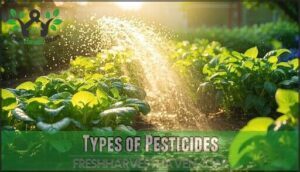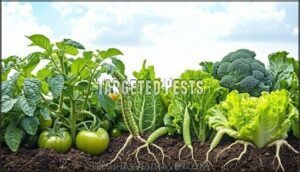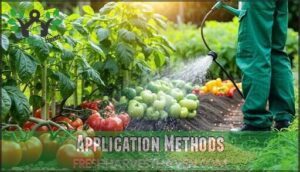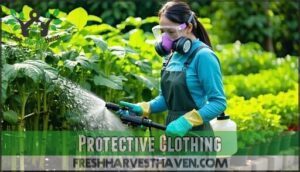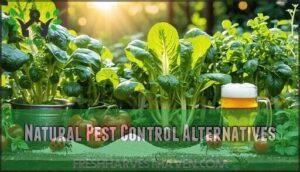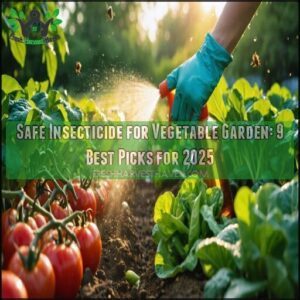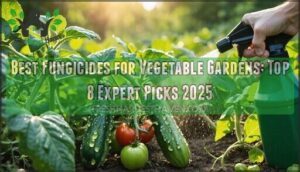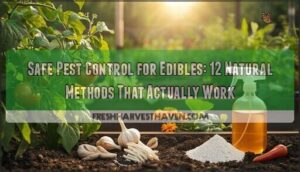This site is supported by our readers. We may earn a commission, at no cost to you, if you purchase through links.
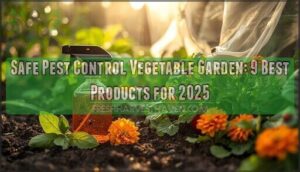
Organic options like neem oil, pyrethrin sprays, and insecticidal soaps effectively target common pests without leaving harmful residues on your produce.
These OMRI-listed products allow you to harvest vegetables just one day after treatment.
Combine these treatments with companion planting, row covers, and beneficial insects for thorough protection.
The key is matching the right organic solution to your specific pest problem – whether you’re battling aphids on lettuce or caterpillars on tomatoes.
Smart gardeners know there’s more to creating an effective pest management strategy than just spraying.
Table Of Contents
- Key Takeaways
- Safe Pest Control Methods
- Choosing Right Pesticide
- Top 9 Vegetable Garden Insecticides
- 1. Bonide Pyrethrin Garden Insect Spray Concentrate
- 2. Garden Safe Neem Oil Concentrate
- 3. Neem Bliss Pure Cold Pressed Oil
- 4. Natria Insecticidal Soap Ready to Use
- 5. BioAdvanced Vegetable Garden Insect Killer
- 6. Bonide Thuricide BT Caterpillar Worm Control
- 7. Milky Spore Grub Killer Granular
- 8. Safer Insect Killing Soap Concentrate
- 9. Monterey Spinosad Organic Garden Insecticide
- Application Safety Measures
- Natural Pest Control Alternatives
- Frequently Asked Questions (FAQs)
- What is the safest repellent for vegetable garden?
- How do you control pests in vegetable garden organically?
- How do seasonal changes affect pest infestations?
- Which pests can survive harsh winter conditions?
- How does pest control affect soil quality?
- Are there benefits to attracting pest predators?
- What plants naturally repel common garden pests?
- When should I stop using pesticides before harvest?
- Can I mix different organic pesticides together safely?
- How do I identify beneficial insects versus pests?
- Conclusion
Key Takeaways
- You’ll get the best protection by combining organic options like neem oil and insecticidal soap with smart practices like companion planting and beneficial insect support.
- You can safely harvest vegetables just one day after treating with OMRI-listed organic pesticides, making them ideal for continuous garden maintenance.
- You need to match your pest control method to the specific problem—pyrethrin for quick knockdown, neem oil for ongoing protection, or BT for caterpillar control.
- You’ll create lasting garden health by using integrated pest management that includes crop rotation, physical barriers, and biological controls alongside targeted treatments.
Safe Pest Control Methods
You want your vegetable garden free from pests but also safe for your family and the environment.
Safe pest control methods use a mix of organic products, careful chemical use, and smart gardening practices to protect both your plants and the ecosystem.
Organic Pest Control
Organic pest control protects your vegetable garden while safeguarding beneficial insects and soil health.
You’ll find natural pest control methods like neem oil, insecticidal soap, and spinosad work effectively against vegetable garden pests without harsh chemicals.
These safe garden pest control options carry organic certification, ensuring they’re genuinely sustainable.
Strengthen your plant defense through natural barriers like companion planting, which deters pests naturally.
Beneficial insects play a key role in integrated pest management.
IPM strategies integrate organic gardening principles for balanced, long-term protection, using methods like companion planting to ensure a healthy garden ecosystem.
Chemical Pest Control
While organic methods work well for mild infestations, synthetic pesticides pack more punch against stubborn pests.
These chemical insecticides require careful handling to prevent pesticide resistance and minimize toxicity levels in your garden.
Application timing matters most—spray on calm, dry days for maximum effectiveness.
Chemical runoff can harm beneficial insects and contaminate soil, so follow label instructions precisely.
Too much chemical spray won’t double your results but can damage plants.
Here are key synthetic options to examine:
- Pyrethroid-based sprays offer broad-spectrum control with lower toxicity levels
- Systemic chemical pesticides provide long-lasting protection through plant absorption
- Contact chemical pest control products kill insects on direct contact
Smart gardeners use these synthetic options sparingly, rotating products to prevent resistance buildup.
Integrated Pest Management
After looking at chemical pest control, let’s talk about integrated pest management (IPM).
With IPM, you’re always monitoring pests and using action thresholds to decide when to act.
Prevention strategies like crop rotation and cultural practices keep pests guessing.
Encourage natural predators—think ladybugs or birds.
This balanced approach blends organic pest control and natural pest control for a healthier garden.
Choosing Right Pesticide
Selecting the right pesticide for your vegetable garden requires matching the product to your specific pest problem and plant needs.
You’ll need to evaluate the type of pesticide, target pests, and application method to guarantee effective control while keeping your vegetables safe to eat.
Types of Pesticides
Understanding pesticide types helps you make smart choices for your vegetable garden.
Each category serves different purposes and safety levels.
- Organic Pesticides like neem oil break down naturally without harming beneficial insects
- Synthetic Pesticides offer powerful control but require careful handling and timing
- Botanical Insecticides such as pyrethrin provide plant-based pest management solutions
- Microbial Pesticides use beneficial bacteria to target specific pests without environmental damage
For example, neem-based solutions are effective against garden pests.
Targeted Pests
Before you spray, know your enemy. Each pest demands its own battle plan for effective garden pest control.
Aphid control targets tiny green invaders that suck plant juices. Cabbage loopers chew through leaves like tiny green machines. Spider mites create fine webs while draining plant health. Hornworms devour tomato plants overnight. Root maggots attack underground, weakening your vegetable garden from below.
You can find the best spray options for eliminating these pests.
| Pest Type | Damage Signs | Target Plants |
|---|---|---|
| Aphids | Curled leaves, sticky honeydew | Most vegetables |
| Cabbage Loopers | Holes in leaves | Brassicas, lettuce |
| Spider Mites | Yellow stippling, webbing | Tomatoes, beans |
| Hornworms | Large holes, stripped stems | Tomatoes, peppers |
| Root Maggots | Wilting, stunted growth | Root vegetables |
Match targeted pests with safe pest control methods for organic pest control success.
Application Methods
Your choice of application methods can make or break your pest control efforts. Each technique targets pests differently and requires specific equipment for success.
Here are four key application methods to master:
- Foliar Spraying – Apply pesticide directly to leaf surfaces using handheld or hose-end sprayers
- Soil Drenching – Pour diluted solution around plant roots to control soil-dwelling pests
- Granular Application – Scatter dry granules around plants for slow-release protection
- Sprayer Types – Choose between pump, trigger, or backpack sprayers based on garden size
Application timing matters most during calm weather to prevent drift. Follow application instructions carefully for proper dilution rates and coverage patterns. Consider using companion planting strategies for a natural approach.
Top 9 Vegetable Garden Insecticides
Choosing the right insecticide for your vegetable garden doesn’t have to feel overwhelming when you know which products actually work.
These nine proven insecticides offer safe, effective solutions that protect your crops without compromising your family’s health or the environment.
1. Bonide Pyrethrin Garden Insect Spray Concentrate
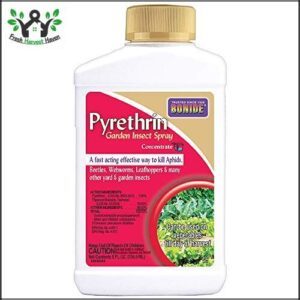
When you want reliable garden pest control that’s fast and natural, Bonide Pyrethrin Garden Insect Spray Concentrate stands out.
Pyrethrin effectiveness comes from chrysanthemum flowers, targeting aphids, beetles, and webworms almost instantly.
Nature’s instant knockout punch – chrysanthemum power targets garden pests without the chemical aftermath.
It’s biodegradable, so you don’t have to worry about long-term residue—your vegetable garden stays safe, even right up to harvest.
Just remember, the dilution ratio is three tablespoons per gallon of water. Apply directly for best results.
While this organic pest control is gentle on plants, be mindful of honeybee toxicity. For natural pest control that’s safe for vegetables, fruits, and flowers, Bonide Pyrethrin offers a trusted pest control method.
2. Garden Safe Neem Oil Concentrate
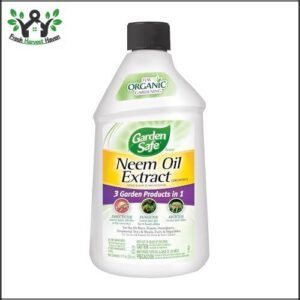
Garden Safe Neem Oil Concentrate is a reliable ally for organic pest control in your vegetable garden.
Acting as an insecticide, fungicide, and miticide, it helps manage everything from aphids to powdery mildew.
You’ll need to follow Neem dilution rates—mix 2-4 tablespoons per gallon of water for best results.
Always avoid hot weather application to protect plant safety.
This natural pest control is safe for organic gardening and gentle on most plants, including veggies and roses.
Use it as part of your garden pest control plan for effective fungal disease control and broad-spectrum defense, all while keeping your harvest chemical-free and thriving.
3. Neem Bliss Pure Cold Pressed Oil
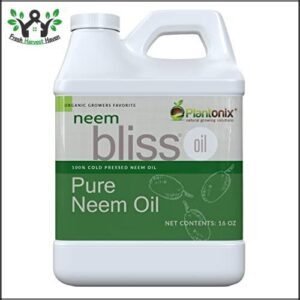
Neem Bliss Pure Cold Pressed Oil stands out among organic pest control solutions for your vegetable garden. This concentrated formula contains 100% cold-pressed neem oil extracted from Indian neem seeds, preserving maximum azadirachtin content for effective natural pest control.
The cold-pressed extraction method guarantees potency while maintaining the oil’s fungal disease control properties. You’ll find Neem Bliss benefits extend beyond pest management – it acts as both insecticide and natural fertilizer, promoting healthier plant growth.
This safe pest control option targets aphids, whiteflies, spider mites, and soft-bodied insects without harming beneficial insects when applied correctly. It’s also worth noting that neem oil suffocates pests and prevents fungal diseases.
The product works for indoor/outdoor usage, making it versatile for greenhouse and garden applications. Mix with warm water for best results. The strong smell indicates authentic neem oil – don’t worry, it’s working effectively against pests while nourishing your plants naturally.
Best For: Gardeners wanting dual-purpose organic pest control that fights pests and feeds plants simultaneously.
4. Natria Insecticidal Soap Ready to Use
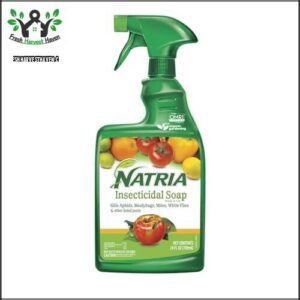
When pest problems strike your vegetable garden, Natria Insecticidal Soap Ready to Use offers immediate relief. This OMRI-certified insecticidal soap spray targets Targeted Pests like aphids, mealybugs, mites, and whiteflies without harming beneficial insects.
Soap Benefits include quick knockdown action and complete biodegradability. The ready-to-use formula eliminates mixing guesswork—just spray directly on affected plants. Application Tips: Cover both upper and lower leaf surfaces thoroughly for maximum effectiveness.
Perfect for Indoor Use on houseplants and outdoor vegetable garden applications. Edible Safety remains paramount since you can harvest vegetables the same day after application. This safe insecticide for plants provides safe pest control without toxic residues.
Organic gardening enthusiasts appreciate its natural potassium salts formula that breaks down quickly in soil, making it environmentally responsible for sustainable gardens.
5. BioAdvanced Vegetable Garden Insect Killer
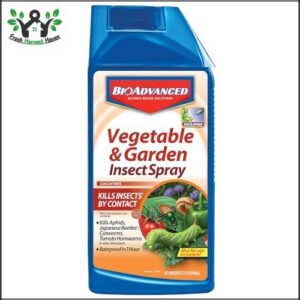
Number five on the list, BioAdvanced Vegetable Garden Insect Killer, stands out for its broad Pest Spectrum. With Active Ingredients designed for fast action, it controls over 70 pests like aphids, caterpillars, and tomato hornworms.
Application Timing is simple—just spray and you’re rainproof in one hour. You can apply it on fruits, vegetables, lawns, and ornamentals, making it versatile for all your garden insect control needs.
Plant Safety is high when used as directed, and you can harvest safely after use—just wash produce well. While it’s not organic, it offers reliable safe pest control. Remember Environmental Concerns and always follow label instructions to ensure Plant Safety.
6. Bonide Thuricide BT Caterpillar Worm Control
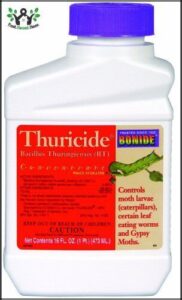
If you’re tired of chewed-up leaves and hungry caterpillars, Bonide Thuricide BT Caterpillar Worm Control is your go-to.
This concentrate uses bacillus thuringiensis kurstaki (Btk formula) for precise Caterpillar Control. It’s deadly to moth larvae like tomato hornworms but leaves bees and ladybugs untouched.
Mix and spray thoroughly, focusing under leaves for top BT Effectiveness. Reapply after rain for consistent Thuricide Application.
Safe Harvesting is a breeze—use up to the day you pick. Organic Gardening fans love its eco-friendly profile and wallet-friendly price.
Protect your vegetable garden with confidence.
- Targets only caterpillars and leaf-eating worms
- Won’t harm beneficial insects
- Safe for harvest day
- Easy-to-mix Bonide BND803 Thuricide Concentrate
7. Milky Spore Grub Killer Granular
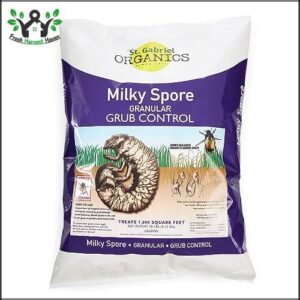
The Milky Spore Grub Killer Granular targets Japanese beetles at their most vulnerable stage. This organic pest control method disrupts the grub lifecycle by introducing beneficial bacteria into your soil.
Unlike chemical alternatives, these spores persist for up to fifteen years once established. Application timing matters most during late summer when grubs actively feed.
Simply spread granules across affected lawn areas and water thoroughly. The bacteria multiplies naturally as grubs consume it, creating lasting protection for your vegetable garden perimeter.
This safe alternative promotes soil health while eliminating future beetle problems. You’ll protect your plants without harming beneficial insects or family pets.
It’s organic gardening at its finest—patient pest management that pays dividends year after year. Best For: Long-term Japanese beetle control without environmental compromise.
8. Safer Insect Killing Soap Concentrate
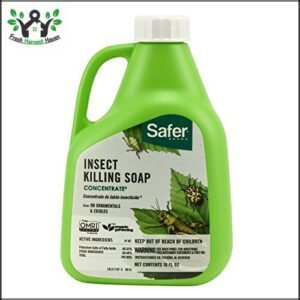
If you’re looking for a natural pest solution after tackling grubs, Safer Insect Killing Soap Concentrate is a solid pick.
This insecticidal soap spray uses potassium salts to target soft-bodied pests like aphids, whiteflies, and spider mites.
It’s OMRI-listed for organic gardening, so you can feel good about safe pest control in your vegetable garden.
For best results, follow Soap Concentrate Uses and Dilution Best Practices—mix 2-4 tablespoons per gallon and spray in the morning or late afternoon.
Watch for plant sensitivity and reapply after rain, as there’s no residue concern, making Application Frequency easy and keeping your harvest clean and healthy.
9. Monterey Spinosad Organic Garden Insecticide
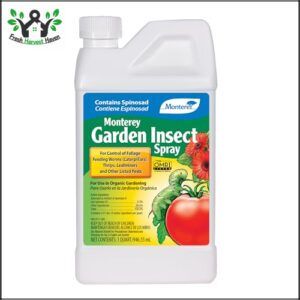
Monterey Garden Insect Spray delivers reliable Spinosad Effectiveness against tough garden pests. This OMRI-certified spinosad formula works as an organic liquid for spraying that targets caterpillars, leaf miners, and thrips without harming your plants.
The OMRI Certification guarantees you’re using approved organic insecticides in your garden. Its broad Pest Spectrum handles multiple insects while maintaining excellent Plant Safety standards.
Application Timing matters – spray during early morning or evening hours to protect beneficial insects. The concentrate mixes easily with water and works within 1-2 days of contact.
You’ll appreciate how this odorless formula won’t leave residues on your vegetables. It’s perfect for organic gardeners who need effective pest control without compromising their garden’s health.
Best For: Organic gardeners looking for an effective and eco-friendly solution to control a wide variety of pests without harming beneficial insects.
Application Safety Measures
When you use pest control products in your vegetable garden, it’s important to follow safety steps to protect yourself, your plants, and the environment.
Always wear protective clothing, read label instructions carefully, and store or dispose of chemicals responsibly.
Protective Clothing
After choosing the right insecticide, focus on protective clothing before you spray. Always wear long sleeves and pants for full skin coverage.
Rubber gloves or chemical-resistant glove types like nitrile help prevent product exposure. Don’t forget eye protection—safety glasses or goggles keep splashes out.
Respirator masks are smart for avoiding fumes. Some folks toss disposable clothing after use for extra safety.
Consider using neem oil concentrate as a safe alternative. Follow manufacturer safety precautions and check the label for recommended gear.
Careful clothing disposal also keeps your home and garden safe from lingering chemicals.
Label Instructions
Pesticide labels serve as your roadmap to successful pest control.
These detailed guides contain critical information for safe and effective application.
Follow these four key elements:
- Dilution Rates: Mix exact concentrations specified for your target pests
- Application Timing: Apply during ideal weather conditions and plant stages
- Re-application Intervals: Wait recommended periods between treatments to prevent resistance
- Pre-Harvest Intervals: Respect waiting periods before harvesting treated vegetables
Label instructions guarantee effective pest management while protecting your family’s health.
Storage and Disposal
Proper pesticide storage and disposal keep your family safe while protecting the environment.
Store all products in their original containers with product labels intact in a locked, dry cabinet away from children and pets.
Never reuse insecticide containers for any purpose – this violates legal regulations and creates serious health risks.
| Storage Essential | Safety Requirement | Legal Compliance |
|---|---|---|
| Original containers only | Prevents contamination | Required by FIFRA law |
| Locked, ventilated space | Protects children/pets | Mandatory in most states |
| Emergency spill kit nearby | Quick response capability | Recommended by EPA |
Keep an inventory to track shelf life and inspect regularly for leaks.
When disposing, contact local hazardous waste programs – never use regular trash.
Triple rinse empty containers before disposal.
Stay prepared for emergencies with spill cleanup materials and emergency contact numbers posted nearby.
Following these safe storage practices protects your garden investment while meeting legal requirements.
Environmental Impact
Pesticide runoff causes water pollution and soil contamination that harm nearby ecosystems.
Bee toxicity threatens pollinator populations essential for garden health.
Biodiversity loss occurs when chemicals kill beneficial insects alongside pests.
Choose eco-friendly pest control methods like organic gardening and natural garden solutions to minimize environmental impact.
Safe gardening practices protect wildlife while maintaining effective pest management.
Natural Pest Control Alternatives
You don’t need harsh chemicals to protect your vegetable garden from pests effectively. Natural pest control methods work just as well while keeping your soil, plants, and beneficial insects healthy.
Companion Planting
Through companion planting, you’ll create natural alliances in your vegetable garden that work like protective partnerships.
Tomatoes paired with basil deter pests naturally while marigolds attract beneficial insects and repel harmful nematodes.
These strategic plant combinations offer multiple benefits beyond pest control methods.
Attracting Pollinators happens when you plant flowers like yarrow alongside vegetables.
Repelling Pests occurs through aromatic herbs like rosemary and mint that naturally discourage insects.
Growth Support develops as plants share nutrients and create beneficial microclimates together.
This organic gardening approach transforms pest prevention into a natural system.
Space Optimization maximizes your garden’s potential while Flavor Enhancement improves your harvest quality through strategic plant placement in vegetable garden care.
Crop Rotation
With rotation benefits transforming your vegetable garden, you’ll break pest cycles naturally. This organic gardening approach improves soil health and prevents pests from establishing permanent homes.
Here’s your planning strategies roadmap:
- Group vegetables by botanical families
- Create a 3-4 year rotation schedule
- Alternate heavy and light feeders
- Switch between deep and shallow-rooted crops
- Document your rotation patterns annually
Nutrient management becomes easier as different plants contribute varying soil amendments. You’re basically outsmarting pests while building healthier growing conditions.
Biological Control
Transformation turns your garden into a battleground where good bugs fight the bad ones. Biological control harnesses nature’s own pest management system through predator introduction and strategic releases.
You’ll deploy beneficial insects like ladybugs against aphids, while parasitoid wasps hunt down caterpillars. Beneficial nematodes patrol your soil, attacking grubs and root-dwelling pests below ground. Microbial pesticides containing Bacillus thuringiensis target specific caterpillars without harming plants.
Conservation biocontrol means creating habitats that support these natural predators long-term. This organic gardening approach requires patience but delivers sustainable pest management. One key aspect of this approach is to guarantee optimal plant health, as healthy plants are naturally more resistant to pests.
Unlike chemicals, these living allies reproduce and spread naturally, providing ongoing protection for your vegetables.
Physical Barriers
Physical barriers provide immediate protection without chemicals. Row covers shield plants from insects while allowing sunlight through.
Simple is smart when it comes to garden protection.
Plant collars stop cutworms from cutting stems at soil level. Copper tape creates an effective barrier against slugs and snails around garden beds. Mesh netting keeps larger pests away from crops.
DIY traps using shallow dishes with beer catch slugs overnight. Hand-picking removes visible pests like beetles and caterpillars.
These mechanical barriers offer reliable pest control methods for your vegetable garden without environmental harm. Many gardeners find plant protection fabrics invaluable for extending the growing season.
Homemade Insecticide Recipes
Sometimes, the best homemade pest control is already in your kitchen.
With a DIY insecticide, you can protect your vegetable garden using natural methods that are safe and effective.
Try these organic methods for homemade insecticide:
- Soap solutions: Targets aphids and mites.
- Oil emulsions: Suffocates soft-bodied pests.
- Herbal sprays: Mint and citrus repel insects.
- Garlic mixtures: Deters beetles and caterpillars.
- Chili pepper spray: Discourages feeding.
Frequently Asked Questions (FAQs)
What is the safest repellent for vegetable garden?
Like a gentle shield protecting your plants, neem oil stands as the safest vegetable garden repellent.
This organic, biodegradable solution effectively repels aphids, whiteflies, and spider mites without harming beneficial insects or leaving chemical residues on your edible crops, making it an excellent organic choice.
How do you control pests in vegetable garden organically?
You control garden pests organically by using neem oil, insecticidal soap, and beneficial insects like ladybugs.
Practice crop rotation, companion planting with herbs, and maintain garden cleanliness to prevent infestations naturally.
How do seasonal changes affect pest infestations?
Seasonal temperature changes trigger pest activity cycles.
Warmer months increase aphid, spider mite, and beetle populations.
Cold periods reduce activity but some pests overwinter in soil or debris.
You’ll see peak infestations during spring emergence and late summer breeding seasons.
Which pests can survive harsh winter conditions?
Winter’s brutal army includes aphid eggs, scale insects, and spider mites that hunker down in bark crevices.
Cutworms and wireworms sleep deep underground while Japanese beetle grubs survive frozen soil surprisingly well.
How does pest control affect soil quality?
Pest control methods directly impact your soil’s health through chemical residues, beneficial microorganism disruption, and organic matter changes.
Chemical pesticides can harm soil bacteria and earthworms, while organic methods like neem oil typically preserve soil ecosystem balance.
Are there benefits to attracting pest predators?
Nature’s detective squad works 24/7 in your vegetable garden. You’ll get free pest control when ladybugs eat aphids, birds snatch caterpillars, and bats devour night-flying insects, reducing chemical needs naturally.
What plants naturally repel common garden pests?
Aromatic herbs like basil, mint, rosemary, and sage naturally repel many garden pests.
Plant marigolds, nasturtiums, and catnip around vegetables to deter aphids, beetles, and mosquitoes while creating natural pest barriers.
When should I stop using pesticides before harvest?
You’ll want to stop using pesticides well before harvest to avoid residues. Check each product’s pre-harvest interval – it’s usually 0-14 days depending on the pesticide type and crop.
Can I mix different organic pesticides together safely?
Generally, you shouldn’t mix different organic pesticides together.
Combining products can create unpredictable chemical reactions, reduce effectiveness, or cause plant damage.
Instead, rotate different treatments or apply them separately with proper timing intervals between applications, which helps prevent unpredictable chemical reactions.
How do I identify beneficial insects versus pests?
Like a detective examining clues, you’ll need to observe key differences between garden helpers and troublemakers.
Beneficial insects have specific body shapes, behaviors, and feeding patterns that distinguish them from destructive pests in your vegetable garden, which is a complete concept to understand for garden maintenance, and recognizing these beneficial insects is crucial.
Conclusion
Like a sturdy fence guarding precious crops, safe pest control vegetable garden methods protect what matters most—your harvest and your health.
You can use OMRI-listed sprays or natural solutions, matching each option to your garden’s pest challenge.
Always read product instructions and choose application methods that preserve beneficial insects. By using these safe pest control vegetable garden practices, you’ll keep your vegetables thriving, your family safe, and the environment protected as you enjoy the rewards of your careful planning.
- https://www.coghillfarm.com/my-guide-to-organic-pest-control-in-your-garden
- https://www.homedepot.com/c/ai/how-to-control-insect-pests-in-your-vegetable-garden/9ba683603be9fa5395fab901b1bd040
- https://extension.okstate.edu/fact-sheets/home-vegetable-garden-insect-pest-control.html
- https://www.gardenary.com/blog/organic-ways-to-treat-pests-in-a-vegetable-garden
- https://njaes.rutgers.edu/fs1123/

